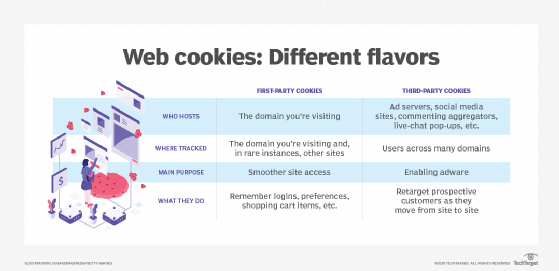
Getty Images/iStockphoto
Google gives third-party cookies a stay of execution
Experts -- and Google -- tell us why 'The Cookiepocalypse' for which advertisers are braced is delayed until at least 2023, and what it means for internet advertising.
Call it the "cookie apocalypse," "the Cookiepocalypse" or the completely uninspired "Google Chrome's deprecation of third-party browser cookies." Whichever you choose, it won't happen until late 2023, if ever.
That was the word last week as Google quietly announced the delay, which affects a wide swath of digital advertising from ad-sales marketplaces to data management platform vendors and data brokers.
Google owns two-thirds of the desktop browser market as well as one of the internet's most powerful advertising platforms. Deprecating anonymized, third-party cookies for ad tracking, which Apple did for its Safari browser last year, is widely seen as a way to protect consumer privacy.
But it also dilutes the value of digital ads for Google, Facebook and many of the roughly 5,000 other ad platforms because it becomes harder to know details about who sees a particular ad. Google is working on an alternative means of measuring anonymized users called Federated Learning of Cohorts (FLoC), which some people view as another identifier. A Google spokesperson said it is not. Instead, he called it a "privacy-preserving API" that can serve ads to large anonymous groups with similar browsing behaviors.
Whatever it's called, FLoC functions as an identifier, said Liz Miller, analyst for Constellation Research. Advertisers and marketers already have to manage many identifiers in their ad spending for Amazon, Apple, Facebook and other platforms. So, FLoC goes back into dry dock for more development work, with input from advertisers, and the third-party cookie gets a stay of execution.
"[Early FLoC concepts] basically just renamed the sign that was plastered out in front of the walled garden without actually doing anything to help brands get through this problem of having to manage complex advertising ecosystems," Miller said. "What is freaking out marketers, agencies and advertisers is the loss of efficiency of spend against the perceived effectiveness of the targeted advertising."

EU launches antitrust investigation
Google's delay of third-party cookie deprecation came two days after the European Union opened an antitrust investigation into Google's advertising practices.
"Google is present at almost all levels of the supply chain for online display advertising," said European Commission executive vice president Margrethe Vestager in a press release on the investigation. "We are concerned that Google has made it harder for rival online advertising services to compete in the so-called adtech stack."
A Google spokesperson said the timing was coincidental. The delay in deprecating third-party cookies from 2022 to 2023 will allow time for public discussion and continued engagement with regulators, and will give advertisers and publishers more time to migrate their services.
Both Miller and Forrester Research's Tina Moffett point out that while Google's communications were strong on intentions, they were weak on technical details.
"The EU announcement -- and then Google's announcement shortly thereafter -- was a strong indication that deprecating the third-party cookie without, really, any clarity and transparency was going to be problematic," Moffett said. "I certainly don't want to speculate, but there were a lot of forces at play that I think forced Google to rethink the timeline."
2023 not a firm deadline
In its blog post, Google left the door open for keeping third-party cookies beyond 2023, as Google and the ad industry work together to make FLoC and other tools satisfy privacy needs for consumers in the open source Chromium Privacy Sandbox project.
Adtech vendors want to build in ad measurement accuracy and reduce ad fraud -- such as fake traffic that artificially inflates the appearance of an ad's reach -- so brands that buy ads can still know what they get in return for their budgets.
Moffett and her Forrester colleagues advise clients to assume third-party cookies are still going to go away. They should move forward with plans to acquire and more effectively use their own first-party data from customers as well as "zero-party data" that customers offer unsolicited -- not derived from browsing or other behaviors.
Since Apple got rid of third-party cookies and Google laid plans to follow, Miller said the industry has begun to lessen reliance on data gathered from third-party cookies. If they fade into disuse naturally, that would leave Google off the hook for making changes to the ad marketplace it built -- broad changes that have drawn "rightful questioning," she added.
"The cynic in me says this is a self-inflicted wound," Miller said. "You tried it. You made a big, bold statement. It didn't go over well, it did not go over with the boom of applause that you thought you were going to get for pretending to be a privacy company."







